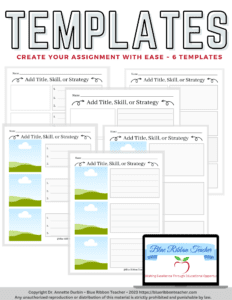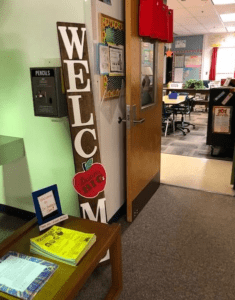Action Research: Question
Question: How can teachers improve student engagement and motivation in assessment and increase achievement?
Increasing student motivation and engagement are areas every educator wants to see increase. The question is ~ How can educators effectively increase these traits?
I decided to take an opportunity to do some action research and was pleasantly surprised with the results. Read on to learn how my students experienced success!
Student Engagement and Motivation Assessment Converns
It’s that time of the year when students are taking state and district assessments, end-of-quarter tests, or even course final exams. Testing is something that everyone needs to do for a variety of purposes. However, if your students are like mine, sometimes there is little motivation to take these tests.

I know testing can be a struggle. Some students do well in class on projects, discussions, and assignments and FAIL the test.
Other students don’t complete or participate in class assignments, but PASS the test. There is never a WIN-WIN!
What can educators do to ensure students demonstrate learning?
Engagement and Motivation: Perspectives
There are various perspectives on assessments. Typically . . . students hate them, and teachers and parents need them to monitor progress.
STUDENTS: Do your students enjoy taking tests? How many of them struggle? How many just don’t care about tests? What is the purpose of taking a test? Why do I need to test!?
TEACHERS: What types of assessments are students taking? Are there testing options? Do you take time to analyze the results? How do you use the results to guide your next instructional sequence?
PARENTS: Is my child learning? Is my child improving? What can I do to support my child?
Action Research: Assessment
As an educator, I had all the same challenges educators and parents face, same student, teacher, and parent perspectives. I wanted to figure out what I could do to change these students’ attitudes about testing so they could see the value and experience success.

Therefore, I decided to allow my students to redo lessons, quizzes, and tests to demonstrate learning. I wanted to find out if the students would take this opportunity to show me learning AND if this option would encourage, motivate, and help students become “owners” of their learning.
I allow my students several options to redo work with varied support and expectations. The number one key to all options ~ the student had to come to me and initiate the learning options.
Student Motivation and Engagement – Process
LESSONS: During the learning process, assignments are not graded in terms of meeting a standard, but in terms of monitoring progress towards meeting the standard. After students have had time to practice the skill, a graded assignment is given to monitor progress. If a student is not happy with the assignment grade, the student can redo this lesson. When a student chooses to redo a lesson, I will take time to provide 1:1 support during independent work time or recess, although I’ve also had students stay after school for additional support. If the student initiates this learning, I will make sure there is time to provide some reteaching.
QUIZZES/TESTS: When students have had ample time to practice concepts, it is time to demonstrate learning. Once the quiz/test is given and graded, students review current results. If the student doesn’t perform to his/her expectation, he/she has the option to demonstrate learning and improve his/her grade. After the student reviews lessons, quizzes, and asks me questions, the student writes me a letter detailing what he/she noticed about his/her errors and what has been done to prepare for the retake. Oftentimes, I’ll take some time to review with the student the overall concepts and then set up a time for the retake.
Conclusion about Student Engagement and Motivation
Action Research Conclusion: As a result of the extra support I provide and opportunities for students to demonstrate learning, the results have been positive. I found that students were motivated to excel by taking time to review lessons and retest. Students also took ownership of their learning not only in my class, but in other classes as well. Parents also told me how their students’ attitudes about testing changed. Students were no longer anxious about testing, but more relaxed, since there was an option for improvement.
Templates: Assessment and Lesson
One of the ways that I supported my students during the lesson and study reviews is using graphic organizers. Therefore, I created these templates that are perfect for creating assessments, games, assignments, reviews, lessons, and even center tasks. These templates were helpful for my students. Therefore, feel free to use this resource by editing the templates to fit your specific needs or print them off and use them as graphic organizers. I’m sure your students will be grateful, too.

Assessments: Changing Attitudes
I’ve seen students who initially “didn’t care” about their work change their attitude and “care” because they know they can do better. As a result of my action research, students began to work harder in class and prepare for the first assessment attempt. Students shared how they appreciated the opportunity to try again and they were less anxious about taking the test. Parents appreciate that I care about their children by allowing them opportunities to learn again and demonstrate that learning. I have always believed that learning doesn’t have to be the same way and at the same time for all students.
I know this is a “new way” of thinking, but I am in the business of ensuring each student that passes through my class LEARNS!! Honestly, this philosophy simply aligns with my perspective about differentiating instruction and differentiating assessment, including personalized learning.
Related Resources: Student Engagement and Motivation
Opportunities to support student’s needs through differentiating learning opportunities are beneficial for students. In the end, this is our goal for students – providing opportunities to demonstrate learning and experience success. Yes, even in failure, learning and success should be the outcome.
Tips for Allowing Test Retakes
Five Tools to Measure Classroom Learning
Final Thoughts About Student Engagement and Motivation in Assessments
Giving students an opportunity to redo lessons, quizzes, and tests is an option for students to not only demonstrate learning, but to increase motivation, engagement, and ownership of learning. Not all students will take advantage of this opportunity; however, those students who do are more motivated to achieve AND are advancing their learning. Isn’t that the goal of education? Why not give your students this option and see what happens? You just might be pleasantly surprised!
how to improve academic performance of weak students, how to increase student engagement in the classroom, student engagement and motivation in assessment




I totally believe in retakes – life is all about being open to second chances in many situations. And we should all be able to learn from our mistakes and do better. That’s when your brain grows! (Yep, teacher here!)
Amen!!
Thanks for sharing!!
~Annette
I think its awesome that you allow the kids to redo some of the work. By the end of the school year kids tend to know way more then they think they do. Even the ones who acted too cool to pay attention. I think 9 times out of 10 kids actually want to do good.
Brittany, I agree. I knew I was doing the right thing when I had a student (really several) have a total turnaround attitude and grades when retakes were allowed. This little option made a HUGE difference for THIS kiddo AND many others!!
Take care,
~Annette
I personally believe that repetition is the key to learning. If kids continue to believe that they must get things right the very first time to succeed, then that creates discouragement towards pursuing bigger challenges in life in fear of making a mistake.
Kyndall, I agree, and those “perfectionist” students will shut down, not to mention those that tell themselves they are not successful.
Thanks for sharing!
~Annette
Great to see educators striving to make changes that really work for their students, keep up the great work, teaching is not an easy path!
Thank you, Liz!!
Have a great day!!
~Annette
I am a big believer in this for many reasons! One is that if it is laziness, usually they wont want to take it again..why? Because they are lazy. Two, if there are visual hands on learners like myself and my kiddos, it takes getting it wrong for it to really CLICK that lightbulb moment and go, “oh i know i know!! Let me at it again because I got it now!!” Three because no…not everyone learns the same way so its unfair to assume we should all be memorizers and reciters instead of thinkers and processors, if that makes sense. I LOVE this post!
Right on, Susan!!! This world is made up of all kinds of people. Wouldn’t it be sad if we all learned the same way, wanted to do the same things in life . . . how boring! Educators should certainly provide a range of lessons for students to grasp and demonstrate learning. Gardner’s (2008) Multiple Intelligences is a great resource for educators.
Thanks for sharing!!
~Annette
I go back and forth on this because there are so many unknown factors, but assuming it was a learning issue, I’m all for retakes. If it’s a laziness issue, I likely would not vote for it. Great topic to ponder!
I know what you mean, Kendra. I do take it on a case by case and give the benefit of doubt to the student. As an educator, you build a relationship with the kids, know their strengths and weaknesses . . . it all works out in the end.
Take care,
~Annette
Interesting concept
It is interesting!
Thanks for stopping by!
~Annette
I voted! Thanks for sharing.
Thank you, Heather!!
Take care,
~Annette
This is an interesting concept to help with learning. I don’t know of any of our teachers that have retakes…hm?!
Hello Angela, yes, when one thinks about it, our purpose is for students to learn. I know I’ve had many, many kiddos walk through my door with “swiss cheese” brains – sooo many foundational skills not learned. It makes more learning challenging with a lack of skills. We just can’t keep pushing the kids on – that equals failing.
Take care,
~Annette
I would have loved this as a kid and I imagine it would have helped me to engage in a different way had I been permitted to do this.
I am with you, Tricia. I’m glad to see more and more teachers starting to think along these lines. It’s a paradigm shift in thinking for sure.
Thanks for stopping by!
~Annette